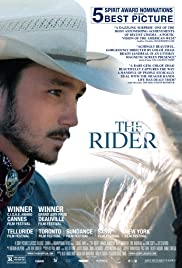
THE RIDER
US, 2017, 104 minutes, Colour.
Brady Jandreau, Tim Jandreau, Lilly Jandreau, Leroy Pourier, Cat Clifford, Lane Scott.
Directed by Chloe Zhao.
In many ways, a quiet film. But, quite an achievement. It will appeal to audiences who enjoy humane portraits. (Action enthusiasts attracted by the title did not pick up on the humane portrait and declared they were bored.)
This is almost a documentary film. The central characters all play fictionalised versions of their lives – but, not all that fictionalised. They are members of the Jandreau family, here called the Blackburn family. There is Tim, the father, successful before, but almost giving up on his life, critical of his son, Brady, a rodeo rider, caring for his 15-year-old daughter, Lilly, who is mentally incapacitated but a lively personality in her relationships with her father and devoted to her brother.
The film is set in South Dakota, in the famous Badlands. There are beautiful scenic shots, vast plains, distinctive mountains in the background. However, in the foreground at the characters and their way of life.
The writer-director is Chloe Zhao, born in Beijing, who studied in London and the United States and stayed in America. She has absorbed the ethos of the United States that prevails out in such state as the Dakotas. She provides an extraordinarily empathetic portrait of her characters and their way of life.
In 2020, she became even more recognised with her writing, directing, editing of Nomadland, winner of many awards as best film, for her direction, for the central performance by Frances Mc Dormand. In Nomadland she uses the technique she developed in The Rider, especially her constant close-ups, often extreme close-ups, on the face of the central character, as well as on other characters. She elicits extraordinary performances by body language and facial action and serenity. In fact, Brady Jandreau would seem to be a born actor, so detailed is his performance, so skilled is his communication with the other characters, and so authentic in his longer sequences of training the horses.
There is also pathos in another character, Lane Scott, a rider, injured, the effect to his brain and communication, confined to a wheelchair, visited frequently by Brady who is able to put him on the machine to relive the experiences of riding. Quite some pathos for the audience.
A film to be recommended, an expert piece of Americana. (And a tribute to the writer-director from China.)
1. The title? The focus on Brady Jandreau? A story of riders, contemporary cowboys? Their lives, motivation, achievement, injury and the consequences?
2. The work of the director, her Chinese background, studies in the United States? Her absorbing the atmosphere and the people of the US? Her writing the screenplay? A portrait of America and Americans?
3. The South Dakota settings, the Badlands, the visual background, the plains and the mountains? Homesteads and fields? The town, the Rodeo, the auctions? The musical score?
4. The semi-documentary style of the film, the cast, fictionalised surnames, but the plot reflecting their lives, relationships, enterprise, achievements, challenges? The supporting characters and their being actual personalities?
5. Brady and his story? Brady and his ordinary life, difficulties with his father, his sister, her age, mental limitations, caring for her? The absence of women in his life? His Rodeo skills? Flashbacks and achievement? With the lasso? With the horses, with Gus, buying the next horse, the finances and his father, the training, the close-up detail of his rapport with the horse, the steps in the training, taming, the horse trusting, his riding?
6. Brady Jandreau’s performance – his skills in being himself in front of the camera, acting skills, the director and her close-ups, communicating a performance just by body language and face close-ups, with him, with the other characters?
7. The tension with his father, the past, the mother’s death, his father’s life, almost giving up, not approving his son, wanting him to get a job? At the final Rodeo?
8. The bond with his sister, her age, mental incapacity, manner of talking, behaving, bond with her brother, with her father, with the other characters?
9. Brady and his visit to Lane Scott, the flashbacks to Scott’s success, his injury, mental incapacity, unable to speak, relying on gestures, Brady putting him on the machine, guiding him in riding and directions? Scott and his facial expressions, gesturing in spelling? The pathos for the audience?
10. Brady and his fans, in the supermarket, autographs and photos, his being obliging?
11. Getting temporary jobs, working in the supermarket, labelling, the checkout, engaging with people?
12. His physical health, the wound to his head, the initial removing the bandage, the staples in his head? Hospital and his reluctance? His hand shaking, the explanation of the brain and the hand coordination?
13. His finally deciding that was better to be in Rodeo than live, packing his gear, his father’s reaction, going with his friend who had done the tattoos on his back, getting ready, watching the riders?
14. The surprise of his ultimate decision, getting off the horse, going to his father and sister, opting to live even with his limitations?
15. A detailed and sympathetic portrait of Brady, his Rodeo life, injuries, the consequences?